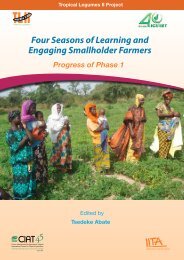Four Seasons of Learning and Engaging Smallholder Farmers - icrisat
Four Seasons of Learning and Engaging Smallholder Farmers - icrisat
Four Seasons of Learning and Engaging Smallholder Farmers - icrisat
Create successful ePaper yourself
Turn your PDF publications into a flip-book with our unique Google optimized e-Paper software.
The best approach to spread the improved technologies to users<br />
• The involvement <strong>of</strong> farmers, farmers groups <strong>and</strong> other stakeholders such as extension agents <strong>and</strong><br />
NGOs help in getting developed technologies to where they would make necessary impacts.<br />
NGO’s, entrepreneurs <strong>and</strong> local Government <strong>of</strong>ficials were found helpful in pushing technologies<br />
to rural areas where most cowpea farmers are located;<br />
• Increased participation in field days <strong>and</strong> farmers’ visits to others’ fields expose the farmers better to<br />
the available technologies. Such visits have positive influence on farmers <strong>and</strong> their willingness to<br />
take up new technologies which they see;<br />
• Crop variety release process could be cumbersome in many countries. The project helped to facilitate<br />
the process by supporting meetings <strong>of</strong> variety release committees in the different countries; <strong>and</strong><br />
• Fostering stronger collaborations with sub-regional seeds initiatives such as WASA in West Africa.<br />
Lessons learned<br />
The proposed training in country <strong>of</strong> graduate students in plant breeding at MSc level would have to<br />
be modified. This is because scientists especially those in Franco-phone countries have requested that<br />
efforts be made to expose their graduate students to the English language during their training. They<br />
would like for their students to go to English speaking countries for the training. We are in contact with<br />
the University <strong>of</strong> Ghana on how to get students from the countries trained in the university. At present<br />
TL II is supporting the research work in cowpea breeding <strong>of</strong> two students, one each from Mali <strong>and</strong><br />
Niger, registered at the University <strong>of</strong> Ibadan <strong>and</strong> sponsored by AGRA.<br />
Seed Production <strong>and</strong> Delivery Systems<br />
Summary<br />
The cowpea seed system delivery component <strong>of</strong> the Tropical Legumes -II Project was carried out with the<br />
participation <strong>of</strong> five countries in Sub-Saharan Africa: Nigeria, Mali, Niger, Mozambique, <strong>and</strong> Tanzania.<br />
Baseline survey on the legume seed supply chain <strong>and</strong> other form <strong>of</strong> value-addition was carried out in<br />
all <strong>of</strong> these countries. The study confirmed that the formal seed systems as they exist were not providing<br />
sufficient quality seed <strong>of</strong> cowpea to meet the dem<strong>and</strong>s <strong>of</strong> farmers. For farmers to benefit from the new<br />
technologies, the public sector needs to work in close partnership with the private sector to improve<br />
seed systems ensuring also that small farmers are brought into the process. These findings were used<br />
to strategize work plan for the project. Knowledge <strong>of</strong> cowpea seed systems advanced significantly in<br />
the first phase <strong>of</strong> the project. Successes were registered in Nigeria, Niger, Mali <strong>and</strong> Mozambique in<br />
production <strong>and</strong> delivery system. The small pack strategy, developed in partnership with the private<br />
sector, was also very successful. Marketing seed in small quantities <strong>of</strong> 1 <strong>and</strong> 2 kg packs that are within<br />
the reach <strong>of</strong> smallholder farmers was found to be both pr<strong>of</strong>itable to a small private seed company <strong>and</strong><br />
attractive to farmers.<br />
The goal <strong>of</strong> the TL II seed component was to develop sustainable seed production <strong>and</strong> delivery systems<br />
that will reach the smallholder farmers in drought-prone areas <strong>of</strong> SSA through interventions designed to:<br />
• Bring about significant increases in the productivity <strong>and</strong> production <strong>of</strong> cowpea;<br />
• Facilitate production <strong>of</strong> Foundation Seed;<br />
• Facilitate production <strong>of</strong> Certified Seed;<br />
• Promote <strong>and</strong> strengthen seed/input marketing through linkages to private seed companies;<br />
• Create awareness to popularize improved stress-tolerant cowpea varieties; <strong>and</strong><br />
• Capacity building to strengthen stakeholders.<br />
106<br />
<strong>Engaging</strong> <strong>Smallholder</strong> <strong>Farmers</strong> | Tropical Legumes II Project

















